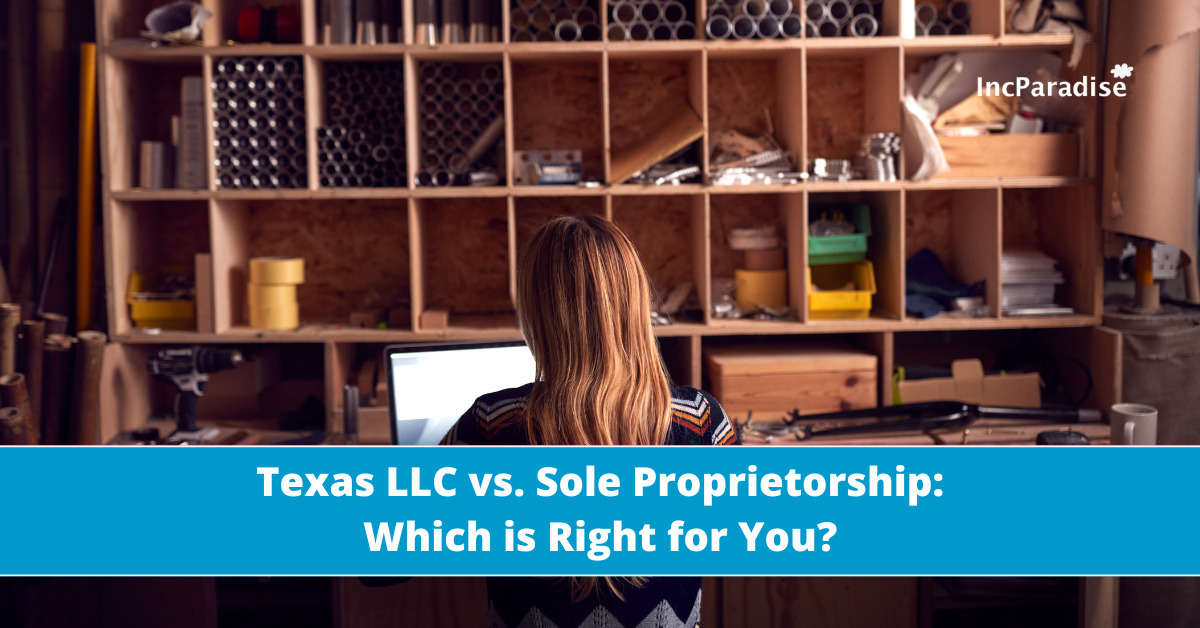When it comes to launching a solo venture, one of the most common questions beginners face is understanding the differences between an LLC and a sole proprietorship. This is a decision that can shape how your business operates, grows, and protects you personally.
A sole proprietorship is the simplest route where you and your business are one and the same. There is no legal separation, meaning you’re personally on the hook for any business debts or lawsuits. In contrast, forming an LLC gives your business its own legal identity, shielding your personal assets and offering more flexibility in management and taxes.
This guide dives into what each structure really means. It’s about the pros and cons, and which paths tend to suit different types of entrepreneurs and business goals. Knowing the nuances of LLC vs sole proprietorship will give you a clearer lens. Thus, you can choose the setup that aligns with your risk tolerance, ambitions, and day-to-day needs.

What is an LLC?
An LLC is an independent business entity formed under state law. It combines elements of a sole proprietorship, partnership, and corporation, providing significant flexibility for the owner. In particular, a single-member LLC is owned by one person who can control the management, operational procedures, and tax treatment of the business. The distinguishing feature of an LLC is the personal liability protection it provides to its members. The owner’s personal assets are shielded from business debts, obligations, and lawsuits. Unlike a sole proprietorship, where the owner and business are legally the same, an LLC’s legal name ends with “limited liability company” or “LLC. It exists as a separate legal entity, protecting the owner’s personal assets in typical business scenarios.
What is a Sole Proprietorship?
A sole proprietorship or ownership is an unincorporated business with one owner and is the easiest and most economical kind of business to form. A person who works a business alone is the sole owner. For instance, if you work as a retailer, are independent, maintain a web-based business, or sell labor and products, you’re a sole owner unless you’ve taken on another business structure.
You can distinguish a business as sole ownership because the owner’s name is the business’ name. However, sole proprietorships can also work under a brand name or a business trademark. The fundamental trait of sole ownership is that there’s no lawful partition between the business and the business owner. The owner is personally responsible for the business’s debts, which is not the case for an LLC.
LLC vs. Sole Proprietorship – understanding a difference
The biggest difference between a sole proprietorship and an LLC is liability protection. An LLC can shield your personal assets if your business is sued or takes a financial hit, which is why many entrepreneurs and established business owners choose it over operating as a sole proprietor. Here are other factors to consider as you compare your options and decide which structure fits you best.
Taxes
A critical contrast between LLCs and sole proprietorships is tax flexibility. Only LLC owners can pick how their business will be taxed. They have the option to choose the default pass-through taxation, or they can choose for the LLC to be taxed as an S-corporation or C-corporation. On the other hand, a sole proprietorship is an entirely different case. They pay their taxes on their profits and also pay complete FICA taxes, including the Medicaid and Social Security taxes. In the case of sole proprietors, the moment your business becomes profitable, taxes will get expensive.
Formation
You may be amazed to discover that you don’t have to do anything explicitly to form a sole proprietorship. You may be working as a sole proprietor without knowing it. Any individual selling goods and services without a partner is a sole owner or proprietor. You will have to apply for permits, conditional on where your business is located, to operate or draft licenses to work legally. To form an LLC, the main formation document necessary is known as the Articles of Organization. This document lays out your LLC’s presence and should be filed with the state where your business is located. The cost to record articles of organization differs from state to state. However, it generally runs between $50 – $200.
Management structure
The management structure of a sole proprietorship is straightforward—the owner makes all decisions without needing input from others. Owner is handling business operations directly or with hired help. A single-member LLC is similar in having one owner with full control but is considered a separate legal entity, often governed by an operating agreement that outlines management and operating procedures. It gets more complex when additional members join, requiring clearer agreements and shared decision-making.
Which one is best for your business?
Choosing the right business structure involves several important factors. Consider the nature of your business and its risks—if your business faces higher liability or you have substantial personal assets to protect, an LLC may be the safer bet. Consider your growth potential and financing needs, as sole proprietorships often face limitations in raising capital and scaling.
Tax implications matter too; while both structures offer pass-through taxation, LLCs provide more flexibility to choose how you’re taxed. Also weigh administrative requirements and costs.While sole proprietorships are simpler and cheaper to maintain, LLCs involve more paperwork and fees. Consulting with legal and tax professionals can help tailor the decision to your unique situation. Ultimately, balancing these factors will guide you toward a structure that fits both your current needs and future ambitions..
Need expert assistance in forming your business?
The bottom line is forming a business can be too risky, and you might need an expert’s advice on the various aspects of forming your business. Now that you are ready to form an LLC or any business, you can opt for an expert to guarantee a smooth process. IncParadise can help you form your LLC in your desired state. We also offer many other services that will ease a lot of the tension on your shoulders. To learn more, contact us now!
Last updated: October 2025






